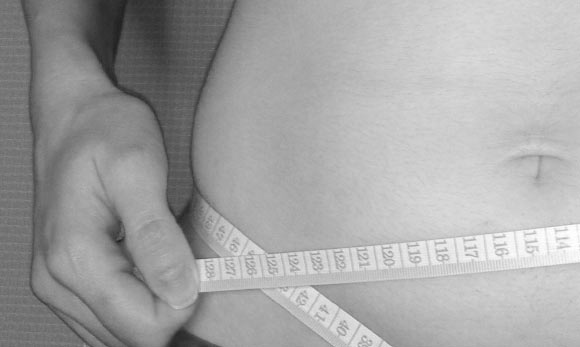An international team of scientists has found a new link between the diversity of bacteria in the human fecal microbiome and levels of visceral fat (body fat that is stored in the abdominal cavity near a number of important internal organs and is linked with higher risks of metabolic diseases such as cardiovascular disease and diabetes).

The new study provides further evidence of possible genetic influences on obesity, through heritable bacteria found in the fecal microbiome.
The team, led by King’s College London, found that participants with a more diverse community of bacteria in their feces had generally lower levels of visceral fat.
“This study has shown a clear link between bacterial diversity in feces and markers of obesity and cardiovascular risk, particularly for visceral fat,” said lead author Dr. Michelle Beaumont, from the Department of Twin Research and Genetic Epidemiology at King’s College London.
“However, as this was an observational study we cannot say precisely how communities of bacteria in the gut might influence the storage of fat in the body, or whether a different mechanism is involved in weight gain.”
The study of 1,313 twins from the Twins UK cohort used data from stool samples provided by participants as part of their annual sampling to extract DNA information about fecal microbes.
The authors compared this to six measures of obesity, including body mass index (BMI) and upper to lower body fat ratios, but found the strongest links with visceral fat.
“We explore links between the fecal microbiota and abdominal adiposity using body composition as measured by dual-energy X-ray absorptiometry in a large sample of twins from the Twins UK cohort, comparing fecal 16S rRNA diversity profiles with six adiposity measures,” they explained.
The findings, published in the journal Genome Biology, were validated using BMI as a measure of obesity in a further two population based cohorts and an additional Twins UK dataset.
The study is one of the largest to look at links between the microbiome and obesity and adds to a body of evidence suggesting genetic influences on obesity.
“There is a growing body of evidence to suggest that gut bacteria may play a role in obesity, and a number of studies are now exploring this in more detail,” said study senior author Dr. Jordana Bell, also from King’s College London.
Whilst this research highlights genes that are relevant to the association between the microbiome and visceral fat, further research is needed to understand the specific influence of these genes and how this could be harnessed for potential future treatments and interventions.
“Further scientific investigation is needed to understand how precisely our gut microbes can influence human health, and if interventions such as fecal transplants can have safe, beneficial, and effective impacts on this process,” Dr. Bell said.
_____
Michelle Beaumont et al. 2016. Heritable components of the human fecal microbiome are associated with visceral fat. Genome Biology 17: 189; doi: 10.1186/s13059-016-1052-7







